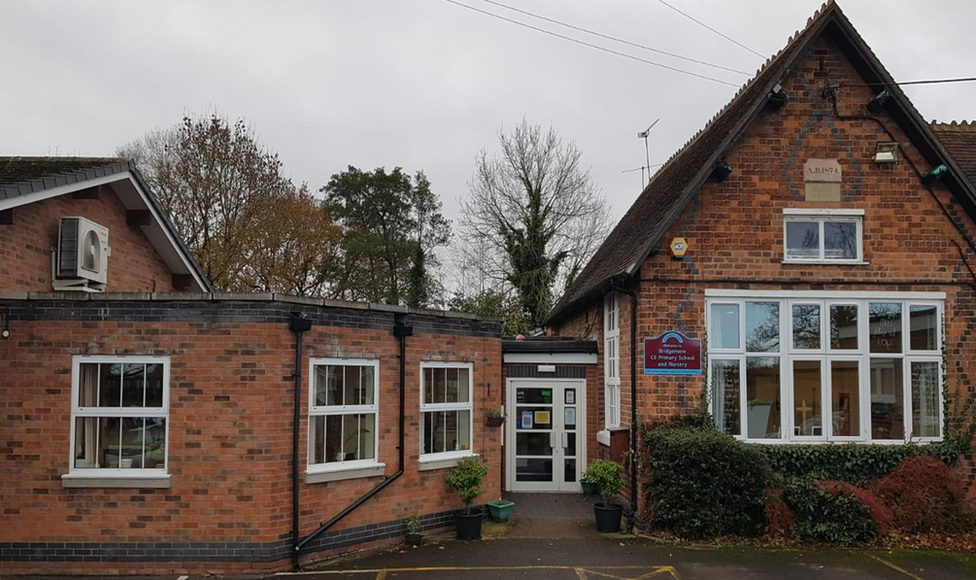Cheshire East Council: Gritting plans near schools 'nonsensical'
- Published

A high volume of traffic passes by Bridgemere CE Primary School, it said
Schools have raised concerns about plans to stop gritting some roads in Cheshire.
Cheshire East Council has removed 230km of roads from its winter gritting plan after a review, with 103km of roads added.
One head teacher said it was "nonsensical" to remove a primary school from a gritting plan.
The chair of the council's highways committee said the changes had been "applied fairly" across the borough.
A review of winter gritting routes was launched following Department for Transport advice to local authorities to ensure the most critical parts are prioritised.

A road would be "far more hazardous" under the plans, head teacher Caroline Middleton said
Bridgemere CE Primary School is a small rural school near Nantwich. Set on a country road just off a busy A road, a high volume of traffic passes by, said head teacher Caroline Middleton.
"It's a dangerous road already so to actually take the gritting away from it you're making it far more hazardous."
School bursar Stacey Rowley said: "Once we've gone back to them and said 'do you realise that you've actually taken our road off and we've got the primary school on it', that it would just be a matter of just adding it back on, but unfortunately it wasn't."
Ms Rowley added that in the past a parent walking along the street injured themselves when the road was accidentally missed off the gritting route.

Amanda Edwards said her school was not "really protected from the elements"
In the north of the county, Whirley Primary School, on the outskirts of Macclesfield, was set on a hill and a bus route, explained head teacher Amanda Edwards.
"I realise other schools have the same issues with their gritting routes being removed, but we are a bit different being on a hill.
"So we're not really protected from the elements. It just seems silly to remove a road that is so heavily populated, with so much heavy traffic on it, foot and vehicle."
Mrs Edwards said the school did grit its site and some nearby pavements but could not do the whole road.
Cheshire East Council said it had found 38% of the highway network needed routine winter maintenance.
It provides maps of the areas where gritting has been removed, external.
Deputy leader and highways committee chair Craig Browne said before the plan was introduced, there was no system for deciding which roads were gritted.
"Prior to this decision being taken, there was no criteria. A number of roads have been included, but very much in an ad hoc way without any strong rationale, we felt that was unfair," he said.

Council deputy leader Craig Browne said if it was shown it had "got things wrong", there would be a review
Under the new plan, he said all routes with a secondary school on would be gritted and 52 of the 125 primary schools.
He said this was because secondary schools had larger catchment areas with pupils required to travel further, while the council actively encourages primary school pupils to walk.
Mr Browne said the policy was introduced to guarantee government funding.
The council receives money from the Department for Transport for the upkeep of the road network and as part of that the government sets out guidelines it is expected to follow.
One of these is to introduce the Well-Managed Highway Infrastructure code of practice which includes reviewing the winter service.
"If we were to sort of digress from those guidelines, we could put at risk, potentially up to £2m worth of that funding."
Mr Browne said in the event "of extreme or severe weather events" it might "look to get additional routes that aren't in the regular programme".
He also stated if it was shown it had "got things wrong", there would be a review.

Follow BBC West Midlands on Facebook, external, Twitter, external and Instagram, external. Send your story ideas to: newsonline.westmidlands@bbc.co.uk, external